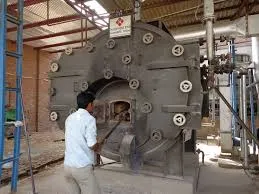
Sep . 15, 2024 07:31 Back to list
steam boiler chemicals
Understanding Steam Boiler Chemicals
Steam boilers are essential components in various industries, providing heat and power for processes and machinery. However, the efficiency and longevity of these boilers depend significantly on the proper management of their chemical environments. Using appropriate steam boiler chemicals is crucial for optimizing performance, preventing corrosion, and ensuring safe operation.
One of the primary roles of chemicals in steam boilers is to treat the feedwater. Feedwater is the water that is supplied to the boiler, and its quality directly affects the steam generation process. Common impurities found in feedwater include dissolved minerals, oxygen, and carbon dioxide, which can lead to scaling and corrosion if not properly managed. Therefore, water treatment chemicals such as oxygen scavengers, scale inhibitors, and pH control agents are commonly added to the feedwater.
Oxygen scavengers, such as sodium sulfite or hydrazine, are used to remove dissolved oxygen from the feedwater. Oxygen is a significant contributor to corrosion, particularly in ferrous materials used in boiler construction. By effectively reducing oxygen levels, these chemicals help protect boiler components from oxidative damage.
steam boiler chemicals

Scale inhibitors are another vital category of chemicals. They work to prevent the formation of mineral deposits that can accumulate on the heat transfer surfaces of the boiler. Scale buildup can lead to decreased heat transfer efficiency and increased fuel consumption, which in turn raises operating costs. Phosphate-based chemicals and polymeric scale inhibitors are often utilized to keep the boiler's surfaces clean.
Furthermore, maintaining the proper pH level of the water is critical to preventing corrosion. In alkaline conditions, the formation of magnetite (Fe3O4), a protective layer on metal surfaces, is encouraged. Adjusting the pH can involve the addition of alkaline agents like sodium hydroxide or sodium bicarbonate.
It is also essential to regularly monitor the concentration of these chemicals within the boiler system. This ensures they remain effective without leading to chemical imbalances that could cause further issues.
Overall, the use of steam boiler chemicals is integral to maintaining the efficiency, safety, and longevity of boiler systems. By systematically treating feedwater and carefully managing chemical levels, industries can minimize downtime, reduce maintenance costs, and extend the operational life of their steam boilers. Proper chemical management, thus, is a fundamental aspect of effective boiler operation.
-
High-Efficiency Commercial Oil Fired Steam Boiler for Industry
NewsJul.30,2025
-
High-Efficiency Biomass Fired Thermal Oil Boiler Solutions
NewsJul.30,2025
-
High Efficiency Gas Fired Thermal Oil Boiler for Industrial Heating
NewsJul.29,2025
-
High-Efficiency Gas Fired Hot Water Boiler for Sale – Reliable & Affordable
NewsJul.29,2025
-
High Efficiency Biomass Fired Hot Water Boiler for Industrial and Commercial Use
NewsJul.29,2025
-
High-Efficiency Biomass Fired Hot Water Boiler for Industrial Use
NewsJul.28,2025
Related PRODUCTS






















